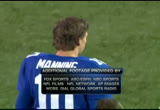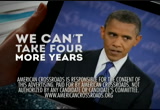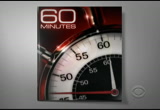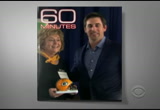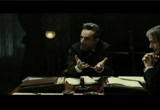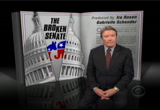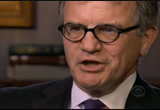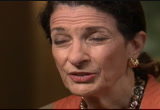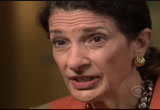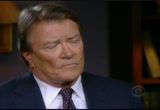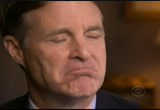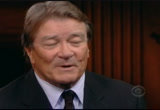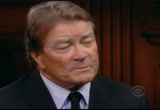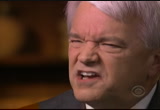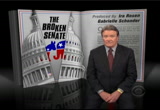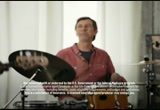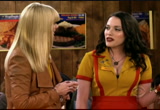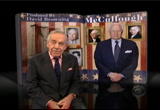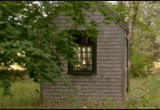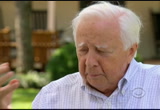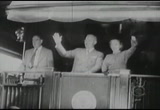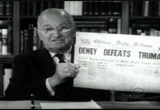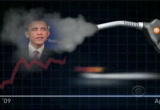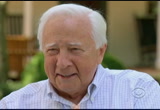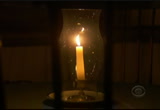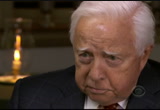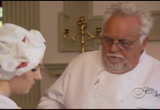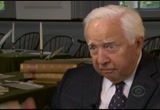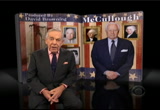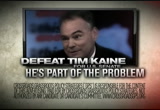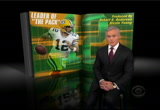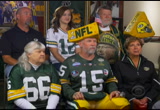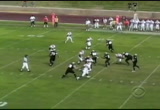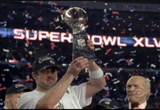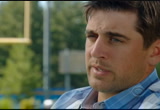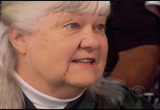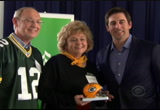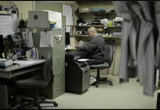tv 60 Minutes CBS November 4, 2012 7:30pm-8:30pm EST
7:30 pm
coming up next -- "60 minutes," amazing race. so long. you've been watching the nfl on cbs, home on super bowl xlvii. oh...there you go. wooohooo....hahaahahaha! i'm gonna stand up to her! no you're not. i know. you know ronny folks who save hundreds of dollars switching to geico sure are happy. how happy are they jimmy? happier than a witch in a broom factory. get happy. get geico. fifteen minutes could save you fifteen percent or more.
7:31 pm
7:34 pm
captioning funded by cbs and ford-- built for the road ahead. >> kroft: on tuesday, voters will elect a new congress, replacing one that's had the lowest approval ratings in the history of political polling. we wanted to know what democratic majority leader harry reid and republican minority leader mitch mcconnell had to say about the level of dysfunction and deadlock they preside over. they call each other good friends, and showed up in the same uniform, but they were clearly playing for opposing teams. you don't think that people are upset about the fact that both of you can't get together and accomplish things? >> i think they're upset about... >> kroft: i think that's one of the reasons right now why your ratings are so low. >> safer: david mccullough is in love with american history, from its struggling birth to its soaring achievements. so in these last hours before
7:35 pm
tuesday's election, in this season of uncertainty, we thought it might be useful to reflect a little with mccullough on history and how the current presidential campaign stacks up. >> the shame of it is, the shame of it is they're spending all this unconscionable amount of money. and what is it producing? a not-very-good show. >> pelley: aaron rodgers is the super bowl-winning mvp quarterback of the green bay packers and... >> he's sensitive, so you have to be careful what you say around him. >> i'm only sensitive when people tell me that i'm a lot smaller in person than they thought i would be. >> pelley: we saw that happen with you and a guy in milwaukee. folks had won a contest to meet rodgers, and then a guy just had to say this. >> you look a little bit smaller than i thought you would be. >> i don't appreciate that.
7:36 pm
7:37 pm
7:38 pm
good-bye jonathan and his creepy little girl hands. i meant... [ male announcer ] or choosing a windows 8 device with help from the experts at staples. another way staples and hp make it easier to upgrade. make your windows 8 experience even better with hp. and this week, get $200 off the hp envy dv6 notebook. staples. that was easy.
7:39 pm
>> kroft: on tuesday, voters will elect a new congress, replacing the one that's had the lowest public approval ratings in the history of political polling. 33 seats are up for grabs in the u.s. senate, which used to be known as the world's greatest deliberative body, a place where difficult issues were carefully considered and debated until a consensus or a compromise was reached. today, it's known more for deadlock, dysfunction, and political gamesmanship, a body unwilling or unable to resolve the major issues of the day-- jobs, deficits, taxes, and how to allocate $1.2 trillion in automatic budget cuts set to go into effect january 1. a number of respected senators have thrown up their hands and quit, and others are speaking out against an institution many think is broken.
7:40 pm
one powerful senator had this advice for the voters. >> tom coburn: the best thing that could happen is all of us lose and send some people up here who care more about the country than they do their political party or their position in politics. >> kroft: senator tom coburn of oklahoma is one of the most influential and conservative members of the senate. he's blocked hundreds of pieces of legislation that he thinks are a waste of money, but he is also one of the few republicans-- or democrats, for that matter-- willing to cross party lines to help break the political gridlock that's kept the senate from dealing not just with big issues but with basic senate business. >> coburn: this is the first time in 51 years the senate has not passed a defense authorization bill, which directs where the... the defense spending is going to go, and in terms of the priorities. our commanders need that. >> kroft: what about a budget? >> coburn: same thing. we haven't done that in four years. >> kroft: the inaction certainly can't be blamed on a pressing legislative schedule.
7:41 pm
take the week of september 10-- after returning from a five-week vacation, the senators had a monday night vote and approved a non-controversial judicial nominee. tuesday, their first full day back, there were no hearings scheduled, only a ceremony to honor the 9/11 anniversary on the capitol steps. ( band playing "god bless america" ) >> kroft: the only major piece of legislation to reach the floor that week was a jobs bill for veterans. >> there are already six programs for veterans now, and this would be a new one. >> kroft: the bill was defeated. on thursday, the senators were headed back to their districts without dealing with issues like the impending budget cuts to 1,000 government programs that will happen january 1 unless the senate takes action. we did notice that they passed a resolution right before adjournment designating a day to raise awareness for elderly people who fall down.
7:42 pm
>> olympia snowe: we should be individually and collectively embarrassed about our failure. >> kroft: in march, republican senator olympia snowe of maine announced that she would not seek a fourth term, citing frustration with the institution. she is one of the last in a nearly extinct group of senate moderates who championed compromise. the others have died off, been defeated in party primaries, or resigned. snowe decided she could be more effective as a private citizen than as a u.s. senator. >> snowe: we weren't solving the big problems. and that's what really stunned me. >> kroft: i think the american public is just baffled as to why the congress, not just the senate, can't get together and come up with some solutions. why ist? >> snowe: you know, that's a very good question, steve. if you think about the objective of public service, it is to solve problems. we're not dealing with tax reform. we're not dealing with the debt ceiling crisis. we're not dealing with the automatic cuts.
7:43 pm
we're not dealing with expiration of the tax rates. i finally said one day, you know, "is there something else we're doing that i'm not aware of? >> kroft: was that one of the reasons you left? >> snowe: it is. i mean, we're talking about issues that are looming on the horizon that threaten our fiscal wellbeing as a nation. >> kroft: it's not always been this way. the senate was once a showcase for american political talent, and people like lyndon johnson, ted kennedy, and howard baker forged alliances with political opponents to pass landmark legislation. >> we've come together in support of a bipartisan budget agreement. >> kroft: the partisan battles were always resolved behind closed doors. olympia snowe remembers how bob dole used to do it when he was majority leader. >> snowe: he would say, "go to my office at 8:30 in the morning and work it out." he was so intent on making sure that we came up with a solution to the issue that was before the senate. we don't know any longer how to
7:44 pm
work out differences in the united states senate. we can't get past our differences. >> this is not bipartisanship. >> we've seen roadblock after roadblock. >> because you can do that, that's theatrics. >> let me go on and ask you another question. >> no, it's my turn. >> evan bayh: eventually, someone has to say, "enough already. stop. we're going to try and do better than this." >> kroft: former indiana senator evan bayh, another moderate, gave up his safe democratic seat and a promising senate career two years ago. his father, birch bayh, had also been a u.s. senator, and he grew up around the institution when it was a more collegial and less partisan place. the two-time governor and one time democratic presidential aspirant said he became disillusioned with the senate when "brain-dead ideology" began to take precedence over "principled compromise." >> bayh: everything is so short- term politically tactical. it's all, "how do we win the next vote? how do we, you know, win the next news cycle? how do we win the next election?"
7:45 pm
>> kroft: bayh told us he particularly disliked going to the weekly senate democratic caucus lunches. >> bayh: and a lot of those lunches are about, "okay, we're a team. we got to stick together. we got to beat the daylights out of the other side. we can't afford anybody straying from the team. if you do, that doesn't help us." >> kroft: what happens if you buck the leadership? >> bayh: well, you buck the party line, there's a price to be paid. what used to be seen as an act of statesmanship, trying to forge consensus across the aisle to move the country forward, is now viewed by many as a... as a betrayal of your party. so you get... you get senators who vote with their party 95%, 98% of the time, and they're being run out because some people think, "that's not enough." >> kroft: why has it been so difficult to compromise? >> coburn: it's leadership. it's pure leadership. when the goal is always to win the next election, rather than to put the country on the right course, whether it's a republican leading it or the... a democrat leading it, the senate is not going to work. >> kroft: we wanted to know what
7:46 pm
democratic majority leader harry reid and republican minority leader mitch mcconnell had to say about all this. both have been in the senate for 25 years, but this was the first time they had ever sat down for a joint television interview. they call each other good friends, and showed up in the same uniform, but they were clearly playing for opposing teams. a lot of people, serious people, think that this institution is broken. is it broken? >> harry reid: our country is in a deep, deep economic problem. we should be doing a lot more than what we've done to address those problems. >> mitch mcconnell: before this congress is over, we will have passed 20 major pieces of legislation on a bipartisan basis. so, clearly, it is possible to come together. what it's not possible to do any longer is to pass trillion- dollar stimulus bills, "obamacare," massive debts and deficit. the american people took a look at that, steve, after two years and said, "please, stop. we don't want any more of that. we want you to work together."
7:47 pm
>> kroft: but you haven't worked together. you have lots of important things to consider. why can't you get together and agree on what to do about these major issues? why can't you come up with a compromise? >> reid: we've run into a situation here where compromise is not part of what we do around here anymore. now, on your program, "60 minutes," speaker of the house of representatives john boehner said, "i reject the word 'compromise'." that's exactly what he said. my friend, senator mcconnell-- "the single most important thing we want to achieve is for president obama to be a one-term president." and that's what's happened this last year and a half. >> mcconnell: compromise is sometimes very difficult. my 47 members of the senate have very different views from harry and his colleagues about how much government we ought to have, how much taxation we ought to have, how much regulation we ought to have. it is not easy to reach agreement when you have very different views, steve, of the direction the country ought to
7:48 pm
take. >> kroft: truth be told, neither party's done much to resolve their differences, and have used every parliamentary trick in the book to obstruct each other's agenda. as minority party in the senate, the republican's favorite tool is the filibuster, a tactic older than this frank capra movie from the 1930s. >> half of official washington is here to see democracy's finest show, the filibuster, the right to talk your head off. >> kroft: by holding forth on the senate floor for days on end, the minority can delay or block bills that have support of the majority. >> great principles don't get lost once they come to light. they're right here. >> bayh: a lot of us have seen "mr. smith goes to washington." and jimmy stewart's standing up, getting haggard, all night in the filibuster to stop some terrible bill. that doesn't happen anymore. senator's got to pick up the phone and say, "you know what? i'm going to filibuster this thing." well, that's enough to stop it. he doesn't have to go to the floor and speak all night. there's no physical discomfort involved.
7:49 pm
so the... it doesn't really require a whole lot of sacrifice on the part of the individual member to bring the whole thing to a stop. >> kroft: under today's rules, any one of the senate's 100 members can stymie legislation or judicial and executive appointments by simply threatening to filibuster and placing a hold on the bill or the nominee. it then requires a super- majority of 60 votes to proceed, and the democrats have only 53. the democrats have retaliated by using the rules to block republican amendments to their bills. >> reid: the senate, in my opinion, steve, has been buried in procedural... a procedural morass. >> kroft: senator reid, you are the majority leader in the senate. you set the agenda for the senate. you bear a responsibility just as much of a responsibility as senator mcconnell to make the system work and to do some things. >> reid: i believe that, if you look at what lyndon johnson had
7:50 pm
to do when he was the leader, as i am, it was a different world. why? you know how many filibusters he had to try to override? one. me? 248. >> kroft: one of the complaints, and it has been directed at both of you and both of your parties, is that it's all become about political gamesmanship. it's all become about winning. it's all become about embarrassing the other party and blaming them for the failures of... of the institution. >> mcconnell: the american people are not as interested in the... the procedural nuances of the senate as they are the results for the country. and when you step back from this and look at the results over the last four years, the american people give us a failing grade. they don't like what we did. >> kroft: you don't think that people are upset about the fact that... that both of you can't get together and accomplish things? >> mcconnell: i think they're upset about... >> kroft: i think that's one of the reasons right now why your ratings are so low. you disagree with that? >> mcconnell: i think they don't like the results and i don't
7:51 pm
blame them. i don't like it, either. >> kroft: all of this is just a reflection of the political deadlock gripping the country, and if you are having trouble figuring out who is responsible for the broken senate, you're not alone. steven smith is a professor at washington university, and one of the countries leading authorities on the history and workings of the u.s. senate. he says, it's all by design. >> steven smith: if you're in the minority in the senate, you know that if you can slow down everything, the majority will have less time to get to its entire agenda. >> kroft: to keep the other side from accomplishing... >> smith: to keep the other side... and this is a problem in today's senate. when the minority blocks a piece of legislation, who does the public blame? is it the minority for its obstructionism, or is it the majority that just wasn't willing to compromise enough to find the votes to get the bill passed? how does someone on the outside really know? you really can't know. and so, who are you going to blame? >> kroft: it seems to suit a lot
7:52 pm
of senators from both parties who can go home and tell their constituents they stood their ground, even if most of the problems facing the country remain unsolved. that will have to wait until after the election. if you are looking for a bright side to all of this, we leave you with senator coburn. >> coburn: i tell people at home "you're lucky we're not in session. we can't hurt you. we didn't create a whole bunch of new spending programs. america got... probably saved $5 billion, $6 billion, $10 billion by the fact that we're a "do- nothing congress." >> kroft: if you're one of the people who is not happy with the current senate, chances are you're not going to be any happier with the next. 20 out of the 22 incumbents up for reelection on tuesday are expected to be returned to office. >> go to 60minutesovertime.com for a conversation with steve kroft about this story. ♪ [ male announcer ] navigating your future
7:53 pm
can be daunting without a financial plan. at pacific life, we can give you the tools to help you achieve financial independence. for more than 140 years, pacific life has assisted families and businesses in meeting their goals, even in uncertain economic times. let us help protect the things that you work so hard for. to find out how, visit pacificlife.com. ♪ charlotte liked the stars better than probably anything, even the cool, sophisticated billy pierce. but one day, charlotte's stars vanished. what feats of incredible power could bring them back to her? suddenly, a gift appeared -- the 30 billion stars she so missed.
7:54 pm
happy holidays, charlotte. i'm billy pierce, and i gave charlotte back the stars. ultrabook, inspired by intel. with intel core processors. ♪ with intel core processors. one is for a clean, wedomestic energy future that puts us in control. our abundant natural gas is already saving us money, producing cleaner electricity, putting us to work here in america and supporting wind and solar. though all energy development comes with some risk, we're committed to safely and responsibly producing natural gas. it's not a dream. america's natural gas... putting us in control of our energy future, now. it's nice to have the experience and commitment to go along with you. aarp medicare supplement insurance plans, insured by unitedhealthcare insurance company. keep dreaming. keep doing. go long.
7:56 pm
>> safer: he's won most of the literary prizes worth winning. his voice is familiar to anyone who watches public television. as an historian, he's bridged that yawning gap between popular and academic history. david mccullough is in love with america's history, from its struggling birth to its soaring achievements. in turn, american readers are in love with david mccullough; more than ten million copies of his books are in print, all published by simon and schuster, a company owned by cbs. in these last hours before tuesday's election, in this season of uncertainty, we thought it might be useful to reflect a little with mccullough on our history and the people who got us here. >> david mccullough: we are an optimistic people, by nature. and we've always had reason to be optimistic. we also have always had reason to think we're a nation in decline.
7:57 pm
that's nothing new about that. you can go back and read the letters of henry adams and... written in the 19th century, and the country was just going to hell. >> safer: and still is. >> mccullough: i grew up in a republican family. and the night of the '48 election, i couldn't stay awake. so the next morning, i got up and my father was in the bathroom shaving. i said, "dad, dad, who won?" and he said, "truman!" like it was the end of the world. well, 30-some years later, i was back home. and he was telling me all about how the world's going to hell and the country's going to hell. i'd heard this so much in my life. and then he paused and he said, "too bad old harry isn't still in the white house." ( laughter ) and that's what we want-- somebody who will address the problems and do things that aren't popular. >> safer: david mccullough's books have all come from a machine invented about the time abe lincoln was president. some of you may recognize it as a typewriter.
7:58 pm
>> mccullough: i bought it when i was embarking on my first book in the mid... early 1960s. >> safer: he calls this world headquarters, an 8' x 12' sanctuary in his backyard on martha's vineyard in massachusetts. why do you use this, as opposed to a computer? >> mccullough: i can't press the wrong button and eliminate a month's work. >> safer: from his trusty royal have come books about the johnstown flood, the brooklyn bridge, the panama canal, and the revolutionary war. and biographies of three presidents-- john adams, teddy roosevelt, harry truman. >> mccullough: the only way to teach history, to write history, to bring people into the magic of transforming yourself into other times is through the vehicle of the story. it isn't just a chronology, it's about people. history is human. jefferson-- "when in the course of human events..."
7:59 pm
"human" is the operative word here. >> safer: and "human" rhymes with "truman," the unlikely victor in that presidential election mccullough slept through as a teenager. >> mccullough: every candidate running for any office ought to study the harry truman 1948 campaign. i think what's important about it, he ran by being himself. and he said, "i'm going to go out there and say what i mean." can you imagine, a politician taking that as his approach? and people loved it. >> safer: the papers, the pundits all agreed-- truman didn't have a chance against tom dewey, even when truman started drawing big crowds campaigning by train. >> mccullough: it was the first time any president had ever done that. he would pull into these little stops where nobody would ever stop and give a talk.
8:00 pm
>> harry truman: i'm coming out here so you can look at me and hear what i have to say, and then make up your own mind as to whether you believe some of the things that have been said about your president. ( laughter ) >> mccullough: he wasn't smooth. he wasn't glib. he just talked straight. he said, "i'm going to go out there and give 'iem hell. and later on he said, "i didn't give 'iem hell; i just told 'iem the truth and they thought it was hell." ( laughter ) >> well, there seems to be a trend and the trend is for dewey. >> safer: election night, it was all over for truman... until it wasn't. >> truman: and the morning after that, in st. louis, i was handed this paper which said "dewey defeats truman." of course, he wished he had but he didn't. and that's all there was to it. >> mccullough: authenticity. it worked-- authenticity. >> safer: as for the current seemingly endless campaign, mccullough gives both sides low
8:01 pm
marks. >> mccullough: the shame of it is, the shame of it is they're spending all this unconscionable amount of money. and what is it producing? a not-very-good show. >> safer: well, it's schoolyard squabbles. >> mccullough: imagine the quantity of words that are being produced, and you think there's anything that's going to stand the test of time in there? i haven't heard it yet. we should demand more of them. we should get to be like people who go to the theater all the time or go to the symphony all the time, and they know a punk performance when they see one and don't like it. th's the waye should be. >> safer: but if you think negative campaigning has hit a new low, mccullough would remind you of the presidential election of 1800, when thomas jefferson beat john adams. the mudslinging in that campaign... >> mccullough: brutal. >> safer: ...makes today's look quite tame.
8:02 pm
>> mccullough: well, jefferson was paying a slander specialist, a journalist, to go after adams, writing that he was mentally unbalanced, he was a hermaphrodite, all these things. >> safer: a hermaphrodite. >> mccullough: and... yeah. >> safer: the adams camp fired back, saying if jefferson were elected, murder, robbery, rape, adultery and incest would sweep the land. a gentler time? hardly. >> mccullough: it was rough and tough. when adams was vice president, presiding over the house of representatives, they went at each other on the floor with fire tongs. they grabbed the fire tongs off and come hammering each other. imagine how that would look on the nightly news. >> safer: in the long history of this country, who was the greatest president? >> mccullough: george washington was our greatest president in that he set the standard. he had no example to go by.
8:03 pm
if he had been a fool or a self- indulgent, lazy glory-hound, it could've been disastrous. he did everything right. >> safer: talking about great moments in american history, mccullough will often say, "i wish i could have been there." we couldn't arrange that, so we took him to philadelphia, where the first fires of the american revolution were fanned. >> mccullough: this is where our country began, not in a grand presence but in a space that's really quite small, but beautiful. i love this building. >> safer: it's carpenters' hall, where delegates from the 13 colonies met for the first time in 1774 to air, in secret, their grievances against british rule. it was treasonous talk. >> mccullough: they closed the windows so nobody could come up and listen at the window. >> safer: because there were so many british sympathizers in... >> mccullough: exactly. >> safer: ...philadelphia.
8:04 pm
>> mccullough: exactly. and they wanteto know who were the ringleaders, what were they saying. >> safer: was that a real worry for these men, that they would be taken and hanged? >> mccullough: yes. certainly, it was. and when they rode away from their homes, their families, they knew that, possibly, they'd never see them again. >> safer: upstairs in the hall, there's a library, the country's very first lending library. >> mccullough: it was ben franklin's idea. at the very beginning comes the idea of learning, of books, of ideas. >> safer: ben franklin still watches over this city. and so does george washington. tell me something-- as a historian, do you get any funny feelings when you wander around philadelphia? >> mccullough: now, morley, you understand, i don't believe in ghosts. you... you... that's clear. >> safer: okay. >> mccullough: but at night, walking up market street or
8:05 pm
chestnut street, going past where they all lived and convened, it gets very quiet. i know that they're here. they really... you feel it. you feel it. walk around at night. walk over to the cemetery at christ church just up the way here. you'll feel it. >> safer: you might feel it too at the city tavern, the watering hole for franklin and the others, where, after hours, they plotted revolution. >> mccullough: this is the place where george washington and john adams first met. this was the hangout, and it was loud, it was lively. well, i would like to start with mr. washington's beer. and say, "here's to our founding father." >> safer: the beer is from washington's own recipe. and you wonder, looking at the examples of colonial cooking from chef walter staib's kitchen, how the founding fathers ever got up from the table-- fried oysters, beef pie,
8:06 pm
mushroom toast... >> walter staib: thomas jefferson served it often. >> safer: ...washington's west indies pepper pot soup, supposedly fed to the troops at valley forge. fried tofu, first introduced here by that early hippie, ben franklin. >> mccullough: whoa! >> safer: mccullough's favorite, homemade sausage and sauerkraut. i think i've hit my limit here. and finally, martha washington's orange cake. >> mccullough: you understand those other times by being in the buildings, walking the streets, hearing the music, and eating the food. >> safer: it's a walk of just a few short blocks from the city tavern to the most revered site in philadelphia, the old pennsylvania colonial statehouse, independence hall, where, in july 1776, the
8:07 pm
colonies, already at war with britain, voted on making the final break. can you give me a sense of the atmosphere in this room on that day in 1776? >> mccullough: the atmosphere is tense. and it's exciting. it was very, very hot. it was summertime in philadelphia. flies biting through their silk stockings. this is on july 2, not on july 4. nothing really happened on july 4. that was the date that was on the document when it was printed. >> safer: the document, of course, was the declaration of independence from britain. the writing of it was largely jefferson's work. this is an early draft, in his handwriting. >> mccullough: in this room, thomas jefferson never stood up to say much of anything, ever. he left that to others to do. >> safer: not a speaker. >> mccullough: not a speaker. and when he spoke, his voice was weak. he would be terrible on
8:08 pm
television today. franklin often looked as though he were asleep. and his admirers and friends said he thought, "if i look like i'm asleep, people might say things they wouldn't say in front of me if i were awake." adams was short and stout, and cranky and abrasive. but honest and courageous, and he had great humor. >> safer: to those still wavering, john adams' speech turned the tide. it was delivered during a thunderstorm-- an hour long, but carrying a short message. >> mccullough: adams insisted now was the time. now was the time. >> safer: whether you celebrate it on the second or the fourth of july, john adams also spelled out how it should be observed. ♪ ♪ >> mccullough: "it ought to solemnized with pomp and parade, with guns, bells, bonfires, and illuminations from one end of this continent to the other, from this time forward forever more."
8:09 pm
which is remarkable when you consider that these colonies were just on this side of the allegheny mountains, and the idea that he's seeing it all the way to the pacific ocean. so they dreamed big, and we ought to remember that, in this little room. >> safer: the new nation was barely out of its adolescence when it realized it had a lot to learn. so the best and brightest of america went to seek out the wisdom of old europe. and they came here, to the most magnificent city of the 19th century, paris. and 200 years later, mccullough followed them on what he called "the greater journey." >> mccullough: there's something magical about this place. >> safer: we'll go along on that journey on part two of "mccullough" next sunday. >> up next, scott pelley with green bay's mvp quarterback, aaron rodgers. ...seems like you guys got a little gassed out there.
8:10 pm
enough already. c'mon guys. next question. mr. lewis? what's your favorite color? what's my favorite color? yes. purple. what's your favorite animal? sea turtle. what's your bedtime? do you believe in space aliens? ...i love puppies. hash browns or home fries? home fries. do you like my dress? why can't you guys ask good questions like this? [ morgan ] for a chance to interview an nfl player and more, join visa nfl fan offers and make your season epic. that if you pick three people, odds are they'll approach everything in their own unique way -- including investing. so we help clients identify and prioritize their life goals. taking that input and directly matching assets and risk preferences against them. the result? a fully customized plan. we call it goals driven investing. you have unique goals. how about a portfolio specifically designed to achieve them? ♪ expertise matters. find it at northern trust.
8:12 pm
and sounds vying for your attention. so we invented a warning you can feel. introducing the all-new cadillac xts. available with a patented safety alert seat. when there's danger you might not see, you're warned by a pulse in the seat. it's technology you won't find in a mercedes e-class. the all-new cadillac xts has arrived, and it's bringing the future forward.
8:14 pm
>> pelley: what do you call the smallest city in the nfl? you call it "title town." green bay, wisconsin's, population could sit in cowboy stadium. but what it lacks in size it has more than made up for in nfl championships. maybe that's why quarterback aaron rodgers seems made for green bay. early in his career, rodgers was considered too small to compete. but he scrambled to a super bowl victory and became the nfl's
8:15 pm
most valuable player. this season, rodgers had a rough start. but lately, he looks like an mvp again, the indisputable leader of "the pack." first time you walked in here, you thought what? >> aaron rodgers: "where am i?" ( laughs ) i was 21, a 21-year-old kid, just been at the nfl draft, got picked by the packers. probably couldn't pick wisconsin out on a map without the name on there. >> pelley: it seems more like destiny than a map that lead aaron rodgers to lambeau field. here, he's surrounded by legends and reminded of 13 nfl championships, one of which is his. the smallest town in the league has the largest number of championships. it sounds a little like you. >> rodgers: well, i think that's why green bay and i get along pretty well is we've had that underdog story as part of our history. >> pelley: "packers" is the oldest name in the oldest town in pro football. the courthouse was new when curly lambeau co-founded the
8:16 pm
team in 1919. rodgers didn't arrive by train but, if he had, there's no way he could have missed his stop. ♪ ♪ on game day, all roads lead to lambeau. and while every team has fans, the packers' fans actually own the team. it is the only non-profit, community-owned sports franchise in the country. tell me which one of you is jerry jones? >> we all are. >> we've all got a share of stock. at least one, anyway. >> pelley: 360,000 fans own shares. the stock can't be resold. it's about pride, not profit. we sat down with a few owners in the packers' hall of fame. steve, what does your cheese head say? >> steve: "nfl owner." >> pelley: owner's box must be very crowded. >> yes, it's the whole stadium. >> 72,000 seats big. >> pelley: the shares go for something around $250. that's good money.
8:17 pm
why did you put good money on the stock? >> the opportunity to own a piece of an nfl franchise that's unique in the world. >> and we can do that. nobody else can do that. >> it's far more than a piece of paper. and that's why i really believe in what vince lombardi said, and i have on the top of my wedge, "god, family, packers." >> pelley: when rodgers arrived there was a fourth word on the wedge-- "god, family, packers, favre." rodgers warmed the bench for brett favre for three years. then, in 2008, a teary "mr. green bay" announced his retirement. >> brett favre: and i wish aaron the best of luck. >> pelley: rodgers would need that luck when favre changed his mind. packer backers went online to "bring back brett." >> i've been a packer fan all my life. right now, my allegiance is 100% to favre. >> pelley: the packers didn't bring back brett. they promoted rodgers, and a lot of their owners were furious. some of the fans hated you. they said some rough stuff to
8:18 pm
you. >> rodgers: yeah, some of them weren't very nice. >> pelley: you had little kids using words about you that i can't repeat on this television show, right? >> rodgers: yeah, their parents probably should have washed their mouths out with soap a little bit maybe. >> pelley: they would say things like, "we want brett! we want brett!" >> rodgers: they might put an expletive in there, as well. >> pelley: it wasn't the first time that rodgers was wounded by words. he's built his career on the doubts of others. the pattern started coming out of high school in chico, california, at 5'11", 165 pounds. i'm told, aaron, that you still have some of your football scholarship rejection letters from college. >> rodgers: i do. >> pelley: why do you keep them? >> rodgers: i like to remember where i came from and kind of the journey that i've been on. >> pelley: do you remember what the coach said from purdue? >> rodgers: i remember the letter. i still have the letter in a place that i can look at it from time to time. >> pelley: i'm told the quote on that letter from purdue is, "good luck with your attempt at
8:19 pm
a college football career." >> rodgers: i don't think there's any direct malice in that. but it wasn't a very favorable letter. >> pelley: no favor from a division one school, or d-2 or d-3. rodgers told us he thought about quitting football until he met craig rigsbee, head coach at b.c.-- butte college, a two-year junior college near rodgers' home. >> craig rigsbee: i said, "hey, you know, you've got to give this a chance. you come out to our place and all you need is a chance." i said, "i think you're going to get bigger, stronger, faster. your grades are there. you're smart, you're intelligent. when you get on a big stage and people will see you for what you have, you... you're going to get a scholarship." >> pelley: turned out, coaches at cal berkley were looking for a receiver when they noticed the guy throwing butte's passes. rodgers got his scholarship and set records at cal. then in 2005, he went to the nfl draft where many expected him to be a top pick, maybe even first.
8:20 pm
and you're going to draft so well that they put you in the green room and put a camera on you. >> rodgers: bad decision. you're wishing you were anywhere but there. >> pelley: four and a half hours went by-- not first, not the first 20. >> with the 24th selection in the 2005 nfl draft, the green bay packers select aaron rodgers, quarterback from california. >> pelley: determined to prove his doubters wrong, he now has the highest passer rating in nfl history and the lowest interception percentage. if the ball was small enough, he could thread a needle. and that's how he sewed up the super bowl in 2010. three touchdown passes that day made him the mvp and put the lombardi trophy back in the grip of green bay. >> clay matthews: he's throwing passes that you can't really defend. >> pelley: green bay all-pro linebacker clay matthews tries to stop his quarterback's completions in practice.
8:21 pm
>> matthews: when he throws touchdowns, i mean, in practice, i just put my hands up and, "what do you want me to do?" you know, he's that good. >> greg jennings: he has a mindset that he's going to be successful. >> pelley: greg jennings is rodgers' favorite receiver. in the huddle, what's going on in there? how is he leading the team? >> jennings: he's very collected. he's calm. he's not going to fail. he's going to come out on top. >> pelley: and when you're down, you show them what? >> rodgers: that i'm not worried, even if i might be a little bit inside. i think, you know, your demeanor and your attitude is so very important if you want to encourage those guys. >> pelley: have a look at how well he faked that demeanor a few weeks before the super bowl after he felt like he'd been hit by a car on ford field. >> rodgers: that was a scary situation, looking back, because, as i watch the film, i don't remember those moments after that concussion. >> pelley: did you know where you were? >> rodgers: no, i didn't. but i can see on the film, the instincts i had that, as gene steratore, came over, the head referee, to ask me how i was, my
8:22 pm
response, was "i'm fine. i'm fine. i'm good." but of course i wasn't. so, you know, that's a situation where you learn from, and you learn that the most important thing is being able to have cognitive brain function post- career than trying to be a tough guy. >> pelley: there's something about getting hit in the head that makes you a smarter quarterback? >> rodgers: yeah, i think so. >> pelley: it's harder to be a "tough guy" these days with defensive linemen bigger and faster than ever. add to that the bounty scandal, in which some new orleans saints were allegedly paid to inflict injury. >> rodgers: every game, i feel like they're trying to take me out. now, i don't know about money. i've never felt there's been money on my head. but that's what happens. the defense is trying to either knock you out of the game or knock you out of your rhythm. it's everything from trash talking to a borderline late hit to a dirty play. >> pelley: you seeing more of it now or less? >> rodgers: about the same. again, i can't speak on any of the bounty stuff. like, i don't know what teams
8:23 pm
were also using systems like that but... >> pelley: you think it's more than one? >> rodgers: could have been. could have been. it's not outside the realm of thinking that there could have been other teams that had similar systems. >> pelley: you may have to be tough to play, but in green bay, you have to be tough to watch. the fans, the owners, shovel snow to find their seats. beatrice froelich told us that she's missed one game since 1957. her boss needed her that one and only sunday. nothing else-- nothing else-- has ever kept her away. >> beatrice froelich: my husband died on a saturday and i went to the game on sunday. >> pelley: you felt that the next sunday that he would want you to go to the game. >> froelich: well, the family that's around you at the seats... >> pelley: you've got a football family. >> froelich: very much. >> very much. >> pelley: is there a drawback to not having a big powerful owner, not to have a jerry jones or a robert kraft? >> rodgers: no, i think it's great. you don't have somebody who got
8:24 pm
a ton of money but doesn't know a whole lot about football trying to tell you what to do. >> pelley: with so many fans, we were surprised when we noticed that rodgers doesn't like being a celebrity all that much. he's a small town guy dating his hometown girl. he didn't love being interviewed. he tends to be shy around strangers. and he can still be touchy about his height. you are 6'2", which most people would consider pretty tall, but you're sensitive about that. >> rodgers: no. i'm only sensitive when people tell me that i'm a lot smaller in person than they thought i would be. >> pelley: we saw that happen with you and a guy in milwaukee. >> rodgers: one more time. >> pelley: folks had won a contest to meet rodgers. you can see how much he's enjoying that, and then a guy just had to say this. >> you look a little bit smaller than i thought you'd be. >> rodgers: i don't appreciate that.
8:25 pm
>> pelley: but why does that get under your skin? come on, 6'2" is pretty good. >> rodgers: you know, i... i just that... that's one of the more ridiculous comments that could be thrown at me is that, especially coming from somebody who's 5'7". >> jennings: he's sensitive. so you got to be careful what you say around him. >> matthews: real sensitive. >> jennings: you know, he takes everything to heart. >> pelley: what kind of things are you talking about? >> jennings: like once he sees this interview, he's going to be sensitive to what... the fact that we're saying he's sensitive. >> matthews: yeah. so, i'll compliment him on the clothes he wears. just make him feel good. and consequently, he'll go out, feel good, play good, make us feel good. so, we just, you know, give him a pat on the back every once in a while. >> pelley: a little quarterback management? >> matthews: absolutely. >> jennings: absolutely. >> pelley: if aaron rodgers still carries a chip under those shoulder pads, it's something they understand in the smallest city in the nfl. one of the things that you have to master if you're going to play on lambeau field is the "lambeau leap" touchdown celebration. early on, rodgers came up short,
8:26 pm
but what a picture-- the kid nobody wanted held aloft by the owners in title town. [ female announcer ] want to spend less and retire with more? then don't get nickle and dimed by high cost investments and annoying account fees. at e-trade, our free easy-to-use online tools and experienced retirement specialists can help you build a personalized plan. and with our no annual fee iras and a wide range of low cost investments, you can execute the plan you want at a low cost.
8:27 pm
so meet with us, or go to etrade.com for a great retirement plan with low cost investments. ♪ ♪ ♪ ♪ ♪ i put away money. i was 21, so i said, "hmm, i want to retire at 55." and before you know it, i'm 58 years old. time went by very fast. it goes by too, too fast. ♪ but i would do it again in a heartbeat.
608 Views
IN COLLECTIONS
WUSA (CBS) Television Archive
Television Archive  Television Archive News Search Service
Television Archive News Search Service  The Chin Grimes TV News Archive
The Chin Grimes TV News Archive 
Uploaded by TV Archive on

 Live Music Archive
Live Music Archive Librivox Free Audio
Librivox Free Audio Metropolitan Museum
Metropolitan Museum Cleveland Museum of Art
Cleveland Museum of Art Internet Arcade
Internet Arcade Console Living Room
Console Living Room Books to Borrow
Books to Borrow Open Library
Open Library TV News
TV News Understanding 9/11
Understanding 9/11